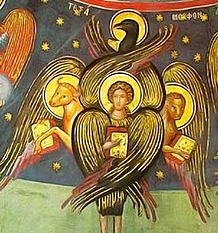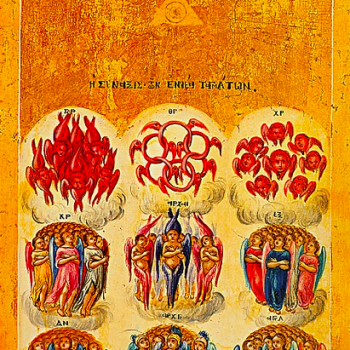THOMAS
Unbar the doors! throw open the doors!I will not have the house of prayer, the church of Christ,
The sanctuary, turned into a fortress.
The Church shall protect her own, in her own way, not
As oak and stone; stone and oak decay,
Give no stay, but the Church shall endure.
The church shall be open, even to our enemies. Open the door!
—T. S. Eliot, Murder In the Cathedral, Part II
Previous installments in this series:
Christian Nationalism; or, the Voice of the Dragon
After These Things Do the Gentiles Seek
An Inquisition Into Heretical Depravity
More Cunning Than Any Beast of the Field
The blatant defiance of Scripture Christian nationalists display might be funny, if the history of nationalism were a little less blood-soaked. Only today, Stephen Wolfe tweeted this:

For those who may be wondering where they’ve heard that phrase before, here are verses 47-53 from the eleventh chapter of the Gospel of John (in the ESV):
So the chief priests and the Pharisees gathered the council and said, “What are we to do? For this man [Jesus] performs many signs. If we let him go on like this, everyone will believe in him, and the Romans will come and take away both our place and our nation.” But one of them, Caiaphas, who was high priest that year, said to them, “You know nothing at all. Nor do you understand that it is better for you that one man should die for the people, not that the whole nation should perish.” He did not say this of his own accord, but being high priest that year he prophesied that Jesus would die for the nation, and not for the nation only, but also to gather into one the children of God who are scattered abroad. So from that day on they made plans to put him to death.
Admittedly I have a good deal more sympathy for the Sanhedrin here than for Dr. Wolfe; at least their “place” (probably an allusion to the Temple) had something to do with God. But I did say we were entering Pelagian territory. Maybe he feels that here, we need grace only as a good example, and our own light and good will are otherwise sufficient to guide our nation.
Select Writings of Shaul men Tarsha
I can only assume, given what appears to be Wolfe’s contempt for the idea of a “new humanity” advocated by “some of your favorite Bible teachers and pastors,” that he would be equally incensed by the thoroughly integrationist theology of the unorthodox rabbi Shaul men Tarsha. He enjoys the unusual distinction of being fairly popular among Christian readers, and especially Reformed ones. This rabbi (who used a pen name) had something of a bee in his bonnet about—well, read a few of his classics for yourself.
Remember that you were at that time separated from Christ, alienated from the commonwealth of Israel and strangers to the covenants of promise, having no hope and without God in the world. But now in Christ Jesus you who once were far off have been brought near by the blood of Christ. For he himself is our peace, who has made us both one and has broken down in his flesh the dividing wall of hostility by abolishing the law of commandments expressed in ordinances, that he might create in himself one new man in place of the two, so making peace, and might reconcile us both to God in one body through the cross, thereby killing the hostility. And he came and preached peace to you who were far off and peace to those who were near. For through him we both have access in one Spirit to the Father. So then you are no longer strangers and aliens, but you are fellow citizens with the saints and members of the household of God.1
That is not the way you learned Christ!— assuming that you have heard about him and were taught in him, as the truth is in Jesus, to put off your old self, which belongs to your former manner of life and is corrupt through deceitful desires, and to be renewed in the spirit of your minds, and to put on the new self, created after the likeness of God in true righteousness and holiness.2
What is sown is perishable; what is raised is imperishable. It is sown in dishonor; it is raised in glory. It is sown in weakness; it is raised in power. It is sown a natural body; it is raised a spiritual body. If there is a natural body, there is also a spiritual body. Thus it is written, “The first man Adam became a living being”; the last Adam became a life-giving spirit. But it is not the spiritual that is first but the natural, and then the spiritual. The first man was from the earth, a man of dust; the second man is from heaven. As was the man of dust, so also are those who are of the dust, and as is the man of heaven, so also are those who are of heaven. Just as we have borne the image of the man of dust, we shall also bear the image of the man of heaven. I tell you this, brothers: flesh and blood cannot inherit the kingdom of God, nor does the perishable inherit the imperishable.3
Men Tarsha’s Master
Similar sentiments occur from time to time in some of men Tarsha’s colleagues, all of whom seem to have derived them from certain maxims—sometimes quite shocking—proposed by their own master. This earlier rabbi lived in the generation following that of Hillel the Elder, and his approach to the Torah was in many respects similar to Hillel’s.
And his mother and his brothers came, and standing outside they sent to him and called him. And a crowd was sitting around him, and they said to him, “Your mother and your brothers are outside, seeking you.” And he answered them, “Who are my mother and my brothers?” And looking about at those who sat around him, he said, “Here are my mother and my brothers! For whoever does the will of God, he is my brother and sister and mother.”4
As he said these things, a woman in the crowd raised her voice and said to him, “Blessed is the womb that bore you, and the breasts at which you nursed!” But he said, “Blessed rather are those who hear the word of God and keep it!”5
To another he said, “Follow me.” But he said, “Lord, let me first go and bury my father.” And Jesus said to him, “Leave the dead to bury their own dead. But as for you, go and proclaim the kingdom of God.” Yet another said, “I will follow you, Lord, but let me first say farewell to those at my home.” Jesus said to him, “No one who puts his hand to the plow and looks back is fit for the kingdom of God.”6
I have come to set a man against his father, and a daughter against her mother, and a daughter-in-law against her mother-in-law. And a person’s enemies will be those of his own household. Whoever loves father or mother more than me is not worthy of me, and whoever loves son or daughter more than me is not worthy of me. And whoever does not take his cross and follow me is not worthy of me.7
What Other Nation Hath God So Nigh Unto Them?

Nor was this particular element in Christ’s teaching new (even if the accent was). The Torah does allow the Jews to accord some privileges and priorities to their compatriots as distinct from foreigners; but it also clearly expects those who know the Torah to follow it at all costs, whatever their family or country do. Nor, even in the context of what special pleading might claim as Israelite nationalism in the Torah, does God countenance cruelty to the alien:
When a stranger sojourns with you in your land, you shall not do him wrong. You shall treat the stranger who sojourns with you as the native among you, and you shall love him as yourself, for you were strangers in the land of Egypt: I am the LORD your God. You shall do no wrong in judgment, in measures of length or weight or quantity. You shall have just balances, just weights, a just ephah, and a just hin: I am the LORD your God, who brought you out of the land of Egypt.8
The LORD your God is God of gods and Lord of lords, the great, the mighty, and the awesome God, who is not partial and takes no bribe. He executes justice for the fatherless and the widow, and loves the sojourner, giving him food and clothing. Love the sojourner, therefore, for you were sojourners in the land of Egypt.9
Then again, maybe this fails to reflect the needs of the modern nation-state, and has to be reapplied in our historical context. Perhaps, in an age of horse-drawn chariots and bows and spears, it just never occurred to God that he could call migrants “an invasion” because the unarmed people had a convenient skin color.

Hominis Ingenium Perpetuam Esse Idolorum Fabricam10
These passages suggest a lot of things. What they certainly do not suggest is that “your natural preference for your own” is something unsullied by sin; something faith in Jesus will never modify or challenge; something that cannot lead you into evil. Nor, to do the rest of them justice, is this drivel characteristic of Christians who profess the doctrine of total depravity11—arbitrarily exempting specific loves or institutions from the risk of becoming idols on the grounds that they are “natural” and “God-given.” As though any of the idols we resort to were anything other than gifts of God we have misused!
Even if any natural impulse were beyond the reach of corruption, why should national ties, of all things, be it? The worship of the emperor and pronouncement that he was “Lord” was the first litmus test of Christian apostasy! And it isn’t as though the behavior of most states, including self-professed “Christian nations” (whatever that’s supposed to mean), is or ever was conspicuously less bad than that of individuals; quite the contrary; “reasons of state” seem chiefly to be invoked in order to explain why a decision that would be despicable and horrifying if made by an individual, is actually fine if a whole society makes it. Well, okay, maybe not fine, but excusable. It’s—look, you do what you have to, to survive, alright? … Oh yes, that’s just the sort of attitude inculcated by the New Testament. Is it really so difficult to believe that maybe our illustrious selves have been rendering unto Cæsar just a teensy bit of the things that are God’s?

Or if we are altogether ignoring civic nationality in favor of ethnic nationality—though on what grounds I have no idea—why on earth should that sentiment be exempt either? Christ put his own family in its place relative to the Kingdom of God. What possible grounds could we have for imagining that our families, our ethnicities, our states, can rightly claim such an exalted place in our loyalties as to modify our theology—or be above his?
Prince of Peace
I would have thought that Christ’s personal nonviolence,12 especially but not only in the Passion, and his chosen powerless social stature would be enough to demolish Christian nationalism. I would have thought his failure to show any interest in or support for the Zealots, or any hostility at all to the Romans, would do the same. I would have thought, when he and his disciples showed no interest in political clout for decades and when the Temptation exhibits his refusal of “the kingdoms of the world and the glory of them,” that all this would do the same. Clearly I would have been wrong.
Why do the actual example of Christ and his saints seem to mean nothing to Christian nationalists?
There is an answer, I think. However, to explain it, we’re going to need to make a somewhat involved detour into questions of both Christian ethics and Church history.

Footnotes
1Ephesians 2.12-19.
2Ephesians 4.20-24.
3I Corinthians 15.42-50.
4Mark 3.31-35.
5Luke 11.27-28.
6Luke 9.59-62.
7Matthew 10.35-38.
8Leviticus 19.33-36.
9Deuteronomy 10.17-19.
10This is a famous quote from John Calvin, often loosely translated “the human heart is an idol factory.”
11This doctrine is widely misinterpreted outside Reformed circles, partly due to ignorance and partly due to different versions of the doctrine prevailing in different circles of the Reformed world. While some Calvinists take it in a more severe sense than this, the sine qua non of total depravity is simply that, apart from regenerative grace, every aspect of human nature is affected by our sinfulness. (The doctrine is thus, to quote Anthony Lane’s description of the view Newman expressed in Tract 90, “ambitious of a Protestant interpretation, though patient of a Catholic one.”)
12Waggish types often cite the cleansing of the Temple as a counterexample to the statement that Christ was nonviolent. Personally, I feel it’s absolutely ridiculous to treat destruction of property (to the extent that anybody’s property even was destroyed) as if it were remotely the same thing as bodily injury to a person. Even if we insisted on classifying both “knocking a guy’s jar of coins over” and “punching him in the face” as violence, they would still be essentially different kinds of “violence”; and the kind of thing that nonviolent tactics are normally designed to protect is the well-being of people, not the comfort or utility of their property, so I am not prepared to consider this a real exception, only a semantic one.













